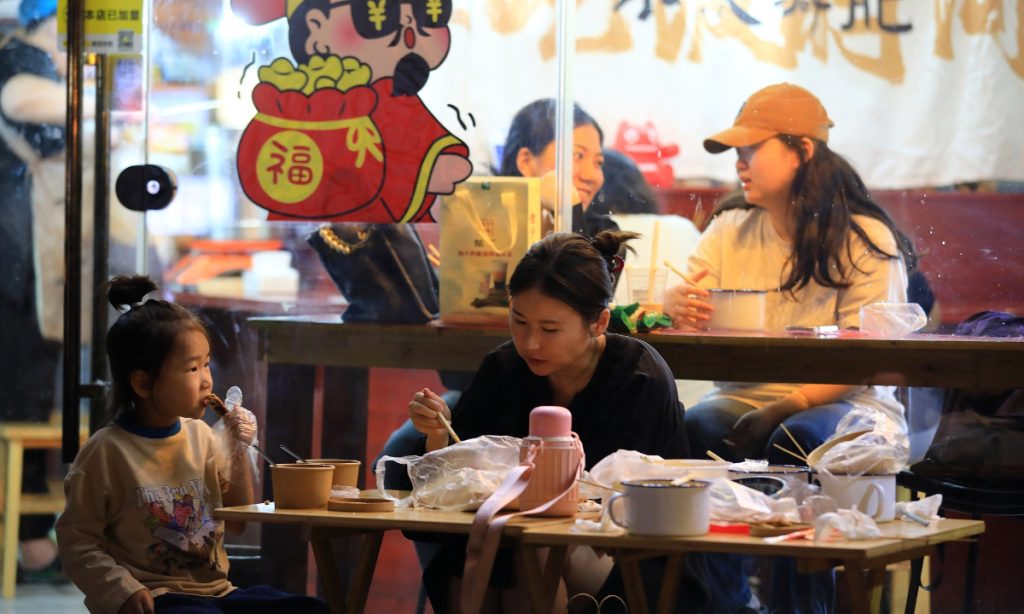Mid-autumn festival holidays further lift catering industry, boost Chinese economy

The three-day Mid-Autumn holidays, which began on September 15, are creating opportunities for the catering industry. Analysts predict that the traditional family reunion holiday will boost local tourism, shopping, and dining sectors, providing a significant boost to economic growth.
As people gather for a big dinner, eating mooncakes, appreciating lanterns and enjoying a light stroll under the full moon, the charm of ancient Chinese festivals has sparked a surge in consumption within the catering industry, fueled by family reunions and holiday celebrations.
Data from the Douyin's local lifestyle services platform reveals an increase of 88 percent increase in searches for "family reunion meals" from September 7 to 13. Additionally, the volume of group meal deals for four or more people has tripled. The platform also reported a 111 percent surge in group orders for mooncakes, according to state-owned news portal southcn.com.
Boosted by festival season, the market for local specialties is in high demand. Hairy crabs from Yangcheng Lake in Suzhou, East China's Jiangsu Province, as well as fruits and mushrooms from Southwest China's Yunnan Province, are gaining popularity, according to domestic media reports.
The surging holiday economy, enhanced consumer market confidence, and record high spending further strengthened the role of consumption as a primary engine for economic growth, said experts.
Data from China-based e-commerce platform Meituan reported a 433 percent week-on-week increase in searches for "Mid-Autumn restaurants," with themed group buying orders surging by more than 76 percent. A staff member at a long-established Baikui restaurant in Beijing told the Global Times that the reservations for Mid-Autumn banquets filled up quickly, with patrons lining up for available spots in the main hall.
The Mid-Autumn Festival also drives significant wine demand through gifts and banquets. Lei Yumeng, general manager of the Zhejiang-based wine importer Xuanyi International Trade Co, said his company saw a 30 percent increase in August sales compared to July, driven in part by a large order in preparations for the festive season. He attributed the surge to strong consumer confidence and a return of gift-giving.
"August sales were indeed substantial, showcasing higher demand for quality dining experiences," Lei told the Global Times on Monday.
Listed catering companies are employing innovative marketing strategies to attract more customers. Chinese restaurant chain Quanjude, for instance, launched a creative cultural event featuring activities including mooncake delivery by individuals dressed as Chang'e, the moon goddess in Chinese mythology, and limited-time online reunion meal deals Meanwhile, hotpot chain Xiabu Xiabu has introduced group meal packages to draw in more patrons.
For many young travelers, exploring local cuisine has become a primary motivation for holiday travel. A university student named Zeng Zhao, from Hangzhou, East China's Zhejiang Province, told the Global Times that he was inspired by food bloggers on China's popular video-sharing platform Bilibili. He planned to follow in their footsteps and embark on a food-hunting journey.
The Mid-Autumn Festival is not just a celebration of tradition but also a catalyst for economic activity, especially in the catering sector, highlighting the resilience and potential of China's consumption market, veteran industry observer Liu Dingding told the Global Times on Monday.
Official data showed that in the first half of this year, the income from catering was 2.6 trillion yuan ($366.5 billion), up by 7.9 percent year-on-year, accounting for 22.8 percent of the total retail sales of consumer goods.